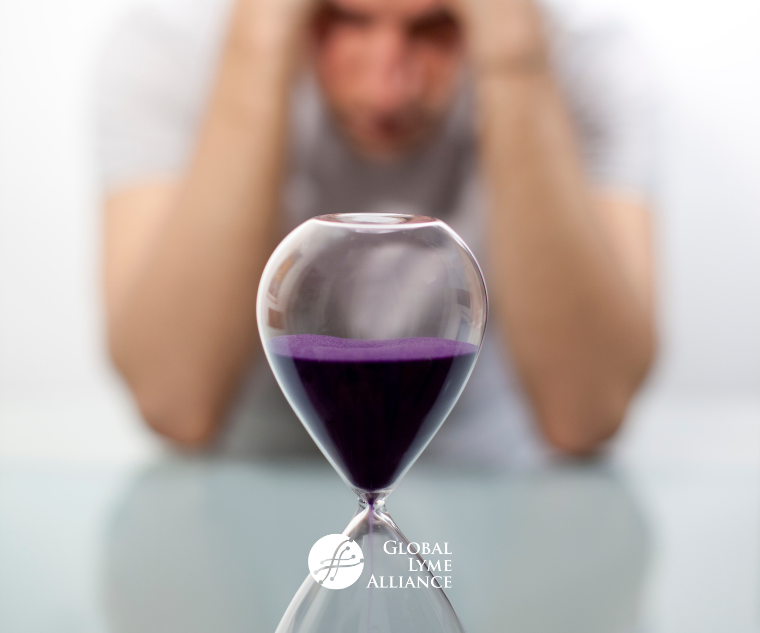
When would I get better? Why was I not seeing improvement every day?
Recently a friend’s toddler son asked her for a snack. Holding his baby sister, my friend told her son he’d need to wait a minute. He looked at her squarely and asked, “Does anyone like to wait?” Kids have a way of telling it like it is. The truth is, no one is great at patience, especially when we’re hungry, tired, or anticipating a big event. Perhaps the hardest time to wait is when we’re sick. “Patients” are ironically named because when we’re stuck in bed waiting to feel better, waiting for medication to work, waiting to live, we become very impatient. I was impatient even before I got sick. A high-achieving lifestyle and the pressures that come with it always made me feel like I needed to hurry up and reach the next goal. If I didn’t, I might miss an important opportunity. I felt that if something didn’t happen right away, it might never happen at all. Then I got sick with chronic active Epstein-Barr virus, Lyme disease, babesiosis, ehrlichiosis, and possible Bartonella and all that forward motion and achievement came to a grinding halt. I was bedridden, hooked up to an IV, with nothing to do but wait. When would I get better? Why was I not seeing improvement every day? Unfortunately, it often takes a long time for late-stage tick-borne illnesses to develop (for me, it took eight years to get an accurate diagnosis), which means it can take a long time to get better. Due to Herxheimer's reactions, trial and error periods to figure out each person’s individual protocol, and setbacks from factors that are both in and out of our control, recovering from tick-borne illness is not a linear process. It can be especially hard to be patient when you feel like you’re taking two steps forward and one step back, or even one step forward and two steps back. Whether you’re three or ninety-three, no one likes to be slowed down. When days, months, and even years of our lives are lost to illness, we feel increased urgency. We’re afraid that we’re losing precious time, as I discussed in my post “A Lymie’s View from 39”. Illness-induced FOMO—fear of missing out—naturally manifests as impatience. A natural response to this impatience is to push our bodies to do more than they can so that we don’t miss out entirely. The minute I started to feel a little bit better, I’d go out and spend that energy. And while I enjoyed whatever I did, I paid for it with a flare of symptoms that sent me back to bed for days. Not waiting caused damage, just as if my friend had not asked her son to wait, she might have dropped the baby or spilled the snack. She told him to wait because she had everyone’s well-being in mind. In just a few minutes, her son got his snack, and no one was hurt in the process. Patience paid off. Still, waiting—especially when it involves resting—goes against everything society has taught us about leading productive, meaningful lives. Though work-life balance has become more valued, busyness and achievement are still seen as badges of honor. What bothered me most as an impatient patient was that I wasn’t doing anything. A friend who’d spent years recuperating from a traumatic brain injury helped reframe my thinking by telling me, “Your body is working really hard to heal right now. In order to let it do its job, you need to rest.” This realization helped me be more patient and loving with my sick body, more willing to give it what it needed—rather than fight against it—so that I could achieve my long-term goal of health. Now that I have achieved and retained remission, I still can be impatient; it’s simply my nature. But I have learned to slow down; to pace myself; to trust my doctors, medications, and body; and most of all, to trust the process. I can’t get back the years I lost to illness. But I’m enjoying the ones I have now—which I wouldn’t have gotten if I’d pushed through the sicker years—and it truly does feel like the life I was meant to live is unfolding in its own time. I have to trust that it will continue to do so, as long as I am patient.
For more blogs, click here

Jennifer Crystal
Writer
Opinions expressed by contributors are their own. Jennifer Crystal is a writer and educator in Boston. Her work has appeared in local and national publications including Harvard Health Publishing and The Boston Globe. As a GLA columnist for over a decade, her work on GLA.org has received mention in publications such as The New Yorker, weatherchannel.com, CQ Researcher, and ProHealth.com. Jennifer is a patient advocate who has dealt with chronic illness, including Lyme and other tick-borne infections. Her memoir, One Tick Stopped the Clock, was published by Legacy Book Press in 2024. Ten percent of proceeds from the book will go to Global Lyme Alliance. Contact her via email below.




-2.jpg)

